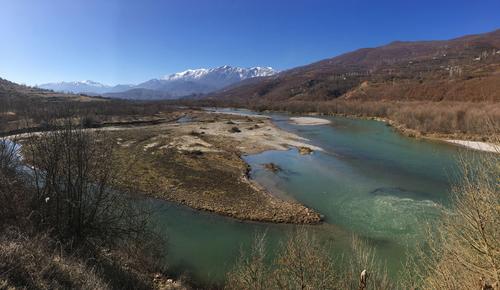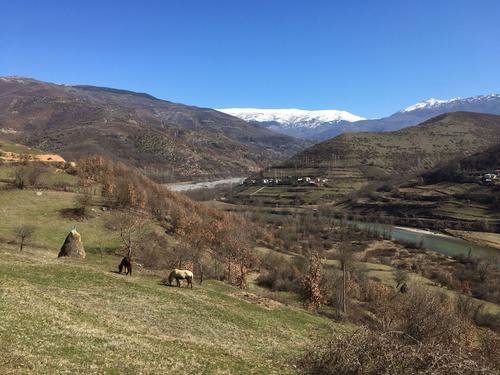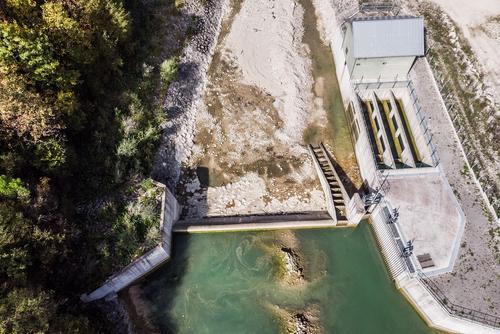River valleys are fertile habitats for humans and animals. Destroying them – to generate supposedly climate-friendly hydropower – has nothing to do with climate protection. If the Renewable Energy Directive recognises this, it will send an important signal for nature conservation throughout Europe.

Europe's largest reservoir could soon be built here - with dramatic consequences for humans and animals.
© Amelie Huber
An old cultural landscape would disappear in the floods of the huge reservoir lake.
© Amelie Huber
Small hydropower plants generate little electricity, but destroy the river ecosystem permanently.
© Amel EmricOn 2 October 2021, the US Ambassador to Albania, Yuri Kim, posed with the Albanian Minister of Infrastructure and Energy above a rugged canyon in the north-east of the country. After more than 60 years, planning measures for the 210 MW Skavica hydropower plant were finally underway with the support of the USA and its controversial infrastructure giant, Bechtel.
In her speech, Kim praised Albania's pioneering role as a hydropower producer: “a country that already boasts one of the greenest electricity production mixes in the world" and helps to "solve climate change and public health concerns … within a region that is too reliant on polluting coal plants.”
The Skavica Dam is the final, to-be-completed barrier out of 7 that the Black Drin River will have to pass on its way to the Adriatic Sea. It would dam up the last free-flowing stretch of the river, creating one of the largest reservoirs in Europe, according to media reports. In it would be submerged much of the impoverished but historic region of Dibra, a long, fertile, idyllic valley surrounded by snow-capped mountains that has emerged in recent years as a hub for ecotourism and organic farming (partly with the help of government subsidies).
All this – living space, hard-earned livelihoods and cultural heritage – is now to be flooded, erased. What’s more, the hydropower project would also destroy a whole range of natural habitats and with them the high biodiversity of the region. Wolves and bears still roam in the forests of Dibra and the almost extinct Balkan lynx uses the area around the planned dam as its main migration corridor – all would be further threatened by the project; not to mention potentially unexplored freshwater species.
With the revision of the Renewable Energy Directive, the EU now can stop such large-scale destruction of habitats for the expansion of certain renewable energies, and set the course for a general rethinking of the energy transition.
This is urgently needed because the global discourse has become strongly distorted. In the conferences that see politicians and the hydropower lobby shake hands, the talk is that the energy transition cannot be managed without the expansion of hydropower capacities. An additional 850 GW must supposedly be generated worldwide by 2050 to keep global warming below 2°C.
Yet a further expansion of hydropower is not only unjustifiable from an ecological and social point of view; it is also an uneconomical and unsuitable climate protection measure. It wasn’t without reason that dams had almost completely lost their societal support by the end of the 1990s. Based on clear scientific findings, the World Commission on Dams, several governments, and even large financial institutions such as the World Bank had publicly declared the construction of large dams to be socially and ecologically unacceptable.
For the last 10-15 years, however, the construction of hydropower plants has been booming again – in Europe as well as on all other continents. Yet, the creation of significant additional capacities is no longer really feasible in the EU, as most rivers have already been severely dammed. In fact, the planned hydropower expansion with 5,734 new projects would only boost hydropower generation by a maximum of 3.9% because most of them are small hydropower plants.
Small hydro produces insignificant amounts of energy and yet has shocking environmental impacts. And although hydropower plants are often not profitable (for example when internal AND external costs are considered), financial incentives and government subsidies still make them attractive sources of revenue for a hungry hydropower industry.
This is precisely where the Renewable Energy Directive could intervene. Because what tends to be overlooked under the current political status quo is the environmental damage that hydropower plants – large and small – are causing in Europe's last unspoilt riverine landscapes. A destruction of nature and biodiversity that is often irreversible.
Europe’s has the most obstructed river landscape in the world with over a million barriers impacting river connectivity. In large part due to the high density of impassable barriers, freshwater biodiversity has already declined by 80% in European rivers and migratory fish populations by as much as 93%. The changes in the river also affect the ecology of the surrounding floodplains, wetlands, and coastal areas. Further ecological degradation through hydropower expansion thus stands in total contradiction to the recently adopted biodiversity targets.
The climate suitability of hydropower is no better: its infrastructure and the associated construction activities destroy important carbon sinks, such as forests, while impairing the CO2-regulating function of the rivers themselves. Reservoirs emit substantial amounts of climate-damaging methane and other greenhouse gases. And hydropower projects jeopardise the adaptability of ecosystems and people to climate change in a variety of ways, not least by creating an unhealthy dependence on an increasingly unreliable energy source.
Recognising how problematic hydropower generation is for nature, people and climate adaptation lies in the responsibility of EU decision-makers in the coming months. Throwing our nature and biodiversity conservation goals overboard for climate protection is the wrong approach. Hydropower must be declared an energy source no longer worthy of financial and political support. This would also send a strong signal to EU accession candidates like Albania, to stop legitimising the destruction of intact ecosystems, livelihood sources and cultural heritage sites as a climate protection measure.


